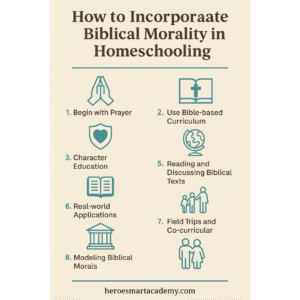Building Education on God’s Truth
For Christian families, homeschooling is about more than just academics—it’s about forming a life built on biblical truth.
As Proverbs 1:7 says:
“The fear of the Lord is the beginning of knowledge.”
So how do we create a homeschool experience that nurtures both the mind and the heart? How do we effectively integrate biblical morality—not just as a subject, but as a way of life?
This guide will walk you through simple, powerful strategies to infuse biblical values into every area of your homeschool.
What Is Biblical Morality?
Biblical morality refers to the values and ethical principles drawn from Scripture. These include:
-
Honesty
-
Humility
-
Love
-
Compassion
-
Forgiveness
-
Patience
-
Justice
-
Respect for life and truth
These values aren’t meant to be theoretical—they’re actionable, relational, and relevant to your child’s everyday decisions.
By integrating biblical morality, you’re helping your child build:
-
A solid spiritual foundation
-
Strong moral discernment
-
A Christ-centered worldview
Why It Matters: More Than Just “Good Behavior”
Including biblical morality in your curriculum does more than teach right from wrong. It:
-
Shapes lifelong character
-
Provides a consistent moral compass
-
Reinforces Christ-centered decision making
-
Nurtures a sense of purpose and spiritual identity
👉 Enroll in HeroesMart Academy » to experience our full “Structured Education with Biblical Morality” curriculum.
8 Practical Ways to Integrate Biblical Morality into Your Homeschool
1. Start Every Day with Prayer and Devotion
Prayer is a powerful way to invite God’s presence into your learning space.
Begin each morning with:
-
A Scripture verse
-
A short devotional thought
-
A prayer of gratitude or intercession
This sets the tone for a day that’s rooted in humility, wisdom, and grace.
🟡 Tip: Let children take turns leading prayers or choosing verses.
2. Use a Bible-Based Curriculum
Rather than treating Bible as a separate subject, choose curriculum that integrates faith throughout.
Look for:
-
Textbooks that include Scripture references
-
Science books that emphasize creation
-
History units that discuss biblical events and Christian figures
👉 Purchase our Bible-Based Workbook Series on Amazon
👉 Download the FREE Ultimate Character Development Workbook for Kids (Ages 6–12) »
3. Teach Character as a Core Subject
Biblical morality begins with character. Explicitly teach virtues such as:
-
Integrity
-
Diligence
-
Generosity
-
Kindness
-
Self-control
Ways to integrate:
-
Weekly character trait studies
-
Scripture-based journaling prompts
-
Real-life application assignments (e.g., acts of service)
🎨 Creative Activity: Have your child design a “Virtue Poster” for each trait studied.
4. Tie Biblical Themes to Core Subjects
Faith doesn’t only belong in Bible class.
Here’s how to integrate it elsewhere:
-
History: Discuss godly leaders, Christian reformers, and biblical events
-
Science: Explore the order of creation and the wonders of God’s design
-
Language Arts: Read biographies of missionaries or analyze biblical parables
-
Math: Highlight patterns and order in God’s world
✍️ You’re not adding more work—you’re deepening the meaning of what’s already being taught.
5. Read and Reflect on Scripture Daily
Make reading God’s Word a family habit.
-
Choose a book of the Bible to explore together
-
Discuss how verses apply to school, relationships, and struggles
-
Encourage personal journaling and prayer reflection
📚 For younger children, use illustrated Bibles or audio recordings to spark interest.

6. Practice Biblical Morality Through Action
Application is everything. Reinforce values through:
-
Service projects
-
Helping neighbors
-
Writing thank-you letters
-
Volunteering at church
Each act becomes a lesson in humility, kindness, and compassion.
🧺 Example: After studying generosity, have your child donate a toy or help pack food for a local pantry.
7. Use Field Trips and Co-Curricular Opportunities
Bring biblical learning to life by:
-
Visiting biblical museums or Christian bookstores
-
Participating in faith-based theater productions or church music teams
-
Attending religious festivals or outreach events
🌱 These immersive experiences make moral lessons tangible and memorable.
8. Model the Morals You Teach
Children imitate what they observe more than what they’re told.
-
Show patience during tough lessons
-
Apologize and seek forgiveness when you make mistakes
-
Celebrate their acts of compassion and honesty
Remember: Your life is the first Bible they’ll ever read.
How to Handle Resistance or Disinterest
Sometimes, your child may push back against moral lessons—especially as they grow.
Here’s how to respond:
-
Ask questions: What’s making this hard to believe or practice?
-
Stay calm and prayerful
-
Avoid lecturing—focus on dialogue
-
Share personal stories and testimonies
Give them space to grow into their faith, not just perform it.
Final Thoughts: Forming Hearts and Minds Together
Integrating biblical morality into your homeschool curriculum isn’t about checking a spiritual box. It’s about:
-
Transforming everyday learning into an act of worship
-
Fostering wisdom and discernment in your child
-
Building a legacy of faith, truth, and grace
As you homeschool, let every lesson, every conversation, and every moment be filled with God’s Word and guided by His Spirit.
Recap & Resources
✅ Start each day with prayer and Scripture
✅ Choose a faith-integrated curriculum
✅ Teach character as a subject
✅ Tie Bible principles into core academic areas
✅ Embrace action-based learning and service
✅ Model godly behavior daily
📘 Explore These Tools Today:
🙌 – Mrs. Nita | HeroesMart Academy

Mrs. Nita is co-founder of HeroesMart Academy, co-creator of Godly Learners curriculum and lead instructor at https://www.youtube.com/@HeroesMartHomeschoolAcademy. When she’s not building homeschool content, you can find her enjoying time with her husband and four little ones.

